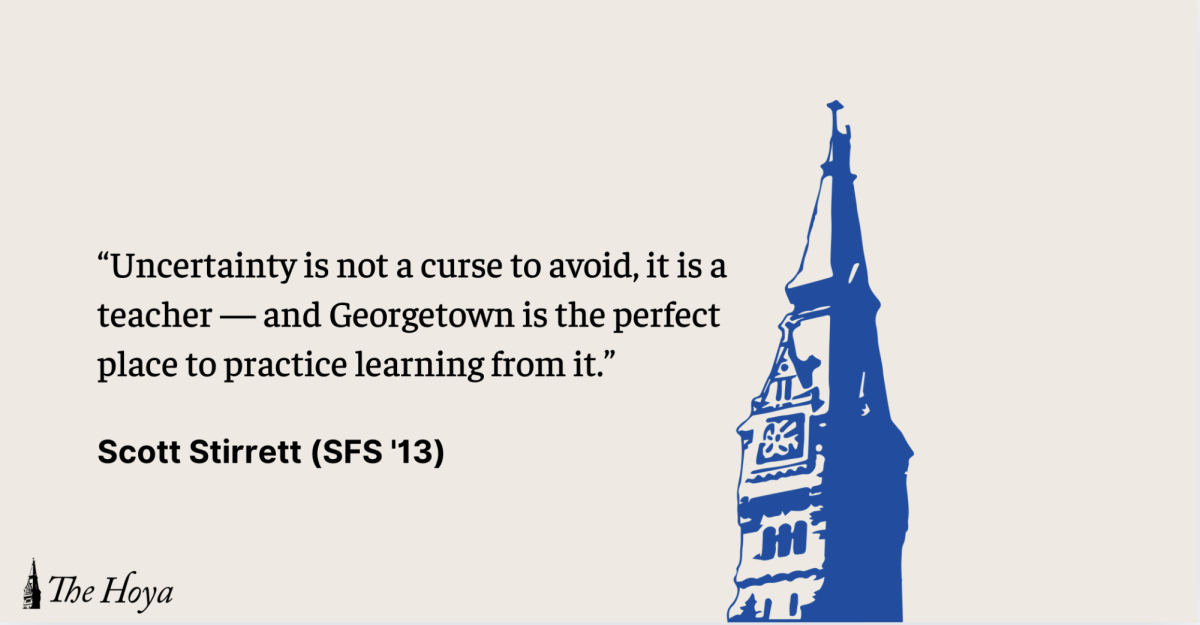
At Georgetown University, there is a premium on knowing: the right answer in class, the right internship for summer, the right job after graduation. Those who play this game well often pull ahead. But here’s the truth I wish I knew as a student: Being okay with not knowing matters more than what you know.
Each semester, the McDonough School of Business (MSB) lobby is filled with students in navy suits juggling case-preparation sessions and coffee chats. On the Hilltop, there is often an unspoken belief that the “right” next step is consulting, banking or law. I once followed that path, starting at Goldman Sachs as an analyst. For many Hoyas, that sounds like the definition of security. But I left Goldman Sachs to build Venture for Canada, a nonprofit that has since raised over CA$80 million and helped more than 10,000 young people launch their careers. This experience taught me something that life from a cubicle never could: Uncertainty, when embraced, can become your greatest advantage.
My first takeaway is about risk. Nassim Nicholas Taleb, a Lebanese American essayist and statistician, coined the term “antifragile” to describe systems that do not just survive stress but actually grow stronger from it. Careers can be antifragile too. At Goldman Sachs, my role seemed stable, but I quickly learned that even the most prestigious industries are fragile — markets crash, firms merge, regulations shift. Now artificial intelligence (AI) and automation are reshaping white-collar jobs, from banking analysts to junior lawyers. Playing it safe will not insulate you from disruption.
Of course, not every Hoya has the same freedom to take risks. For first-generation students or those supporting family, the stakes can be much higher. That is why it helps to think of risk in smaller, more accessible ways. On campus, risk might look like trying a course outside your major, joining a club that intimidates you or pursuing an unconventional internship. These experiments carry little downside but build the adaptability you will need in a world defined by uncertainty.
My second takeaway is about how you treat yourself when things go wrong. In my first years building Venture for Canada, rejection was incessant from funders, partners and prospective employees. Early on, I would beat myself up over every mistake. That habit began at Georgetown: As a student, I pushed myself so relentlessly that I experienced panic attacks. I thought the only way to succeed was to work harder and to measure myself up against classmates who seemed to have it all figured out. The pressure to know every answer and secure the perfect internship left little room for mistakes or for kindness toward myself.
I eventually learned resilience requires not just grit but also self-compassion. Hoyas know the feeling of falling short: the consulting interview that ends in silence, the fellowship rejection email, the case competition loss, the grade that stings. The instinct is to compare yourself to peers who look like they have everything figured out. But comparison is a trap.
Research shows self-compassion fosters resilience and reduces anxiety. Georgetown’s Jesuit value of “cura personalis,” or care for the whole person, is not just about how we treat others. It is also about how we treat ourselves. Extending that compassion inward when things do not go as planned is what allows you to recover, reflect and keep moving forward.
My final takeaway is about mindset. Thriving in uncertainty means approaching your career like an entrepreneur, even if you never start a company. An entrepreneurial mindset is about curiosity, initiative and problem-solving. It is about seeing constraints as opportunities. When I launched Venture for Canada, I had to experiment constantly, iterate on programs and adjust to setbacks. That mindset, more than any technical skill, made the difference. And it is one every Hoya can practice.
Georgetown is the perfect place to build this muscle. Join a student group and test a new idea. Take advantage of entrepreneurship initiatives on campus. Ask hard questions in class instead of waiting for the “right” answer. Each of these choices develops the resourcefulness and initiative that employers and the world need most.
Looking back, my cubicle at Goldman Sachs seemed like security, but the bigger risk would have been never leaving it. Uncertainty is not a curse to avoid, it is a teacher — and Georgetown is the perfect place to practice learning from it.
So before you default to the “safe” pipeline, ask yourself: “What would I do if I were not afraid of the risk?” The answer to that question may change your life, as it did for me.
Scott Stirrett (SFS ’13) is the founder of Venture for Canada and the author of “The Uncertainty Advantage: Launching Your Career in an Era of Rapid Change.” He is a former opinion columnist for The Hoya.